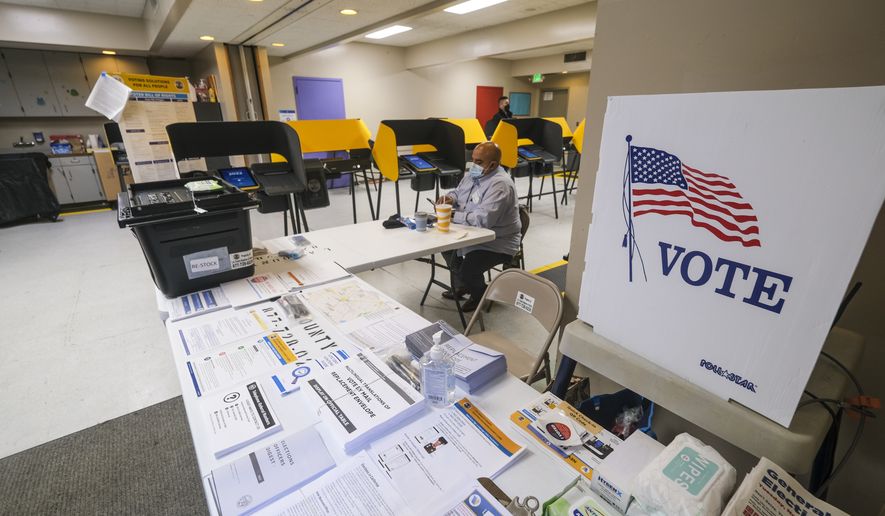Voting machine glitches in New Jersey and Arizona revived fears of widespread election fraud as voters across the country cast ballots in Tuesday’s highly scrutinized midterms elections.
In Mercer County, New Jersey, election officials reported printing and scanning issues as voters arrived at the polls, causing voters at 130 polling places to fill out paper ballots for hand counting rather than sending them through a scanner to be machine tabulated.
In Arizona, election officials reported vote-counting machine outages in about 20% of polling sites in Maricopa County, the state’s most populous county. Voters were also instructed to deposit their ballots in a secure box to be counted at a central facility later Tuesday.
Republicans in the state, as well as the Republican National Committee, filed suit demanding that polls stay open later to accommodate voters who were delayed by the foul-ups.
The glitches quickly ignited a firestorm online.
Arizona Republican Party Chairwoman Kelli Ward told Steve Bannon that the problem in Arizona was a result of “malfeasance, not just incompetence,” during an appearance on the former Trump adviser’s podcast “War Room: Pandemic.”
Bloomberg, which monitored reaction on several social media platforms, said online chatter picked up steam as the day progressed.
“Mike Lindell was right about those machines,” comedian Terrence K. Williams tweeted, referring to the MyPillow CEO who has stood by his unproven claims that the 2020 presidential election was stolen from former President Donald Trump.
“This is 2022, and we are the most advanced country but somehow we are the most advanced country but somehow this [is] happening?” Mr. Williams tweeted in a separate post. “I SMELL CHEATING.”
In both states, election officials attempted to assure voters that their ballots were secure and would be counted.
“If there are long lines at the location you’re at, or issues with the tabulator, if you would prefer to go to another location, you can do that,” Maricopa County Board of Supervisors chairman Bill Gates said in a video posted on Facebook. “It doesn’t matter where you go, as long as you’re a registered voter here in Maricopa County.”
Maricopa County officials said later that they had identified a solution to the tabulation issues, which they said stemmed from a printing issue with the ballots.
In New Jersey, Democratic State Committee Executive Director Saily Avelenda stressed in a statement that every vote would be counted.
“Voters will vote as they usually would, so that experience will be the same,” she said. “We have deployed resources from our Voter Protection team to make sure the tabulation of the vote will go smoothly.”
But the seeds of distrust had been sewn again.
Mr. Lindell, who is embroiled in a $1.3 billion lawsuit brought by voting manufacturer Dominion for his claims related to the 2020 election, told The Washington Times that he had deployed teams to polling sites throughout the U.S. and hired a cyber team to interrogate the election results during a live stream on his website Tuesday evening.
“We’re covering this election like nothing other,” he said. “We’re going to show, with cyber teams, the crime in real-time.”
There is no evidence of widespread fraud or manipulation of voting machines in 2020. Exhaustive reviews in states contested by Mr. Trump all affirmed Mr. Biden’s win, while dozens of judges, including ones appointed by Mr. Trump, dismissed numerous cases making unsubstantiated claims of wrongdoing.
Election officials have defended the system. They note the many checks in place to ensure only one vote per person is counted, the reviews that ensure machines accurately count ballots, and the efforts to identify any fraud attempts.
“State and local election officials have contingency plans in place so voters can have confidence in our elections,” the National Association of Secretaries of State and the National Association of State Election Directors said in a statement.
Election officials acknowledge electronic voting systems can be vulnerable, and they have taken numerous steps to increase security since the 2016 election when it was determined that Russia looked for vulnerabilities.
Congress has sent nearly $900 million to states to boost their cybersecurity defenses, including hiring more IT staffers, replacing outdated systems and adding regular security testing.
And beyond glitches in Arizona and New Jersey, voters experienced no widespread problems beyond what would normally be expected in an election.
“These are things we see in every election cycle,” said Susannah Goodman, director of election security at Common Cause, a group that advocates for voting access. “There’s nothing majorly concerning this morning.”
• This article is based in part on wire service reports.
• Joseph Clark can be reached at jclark@washingtontimes.com.




Please read our comment policy before commenting.